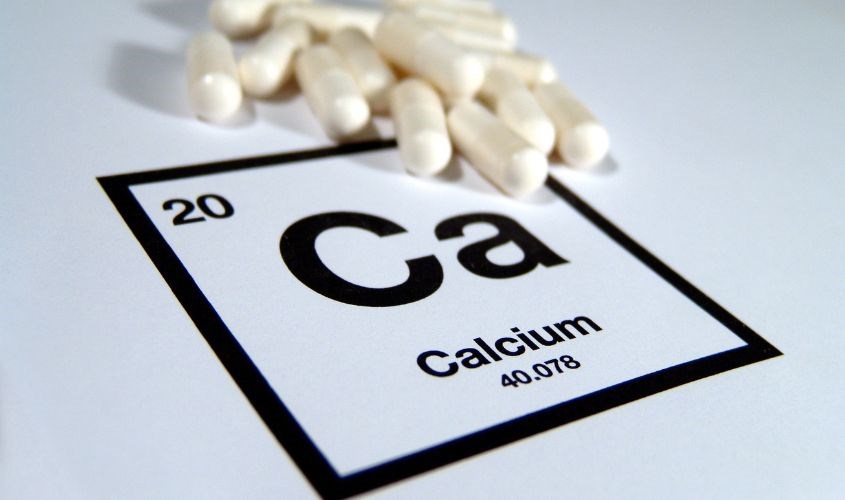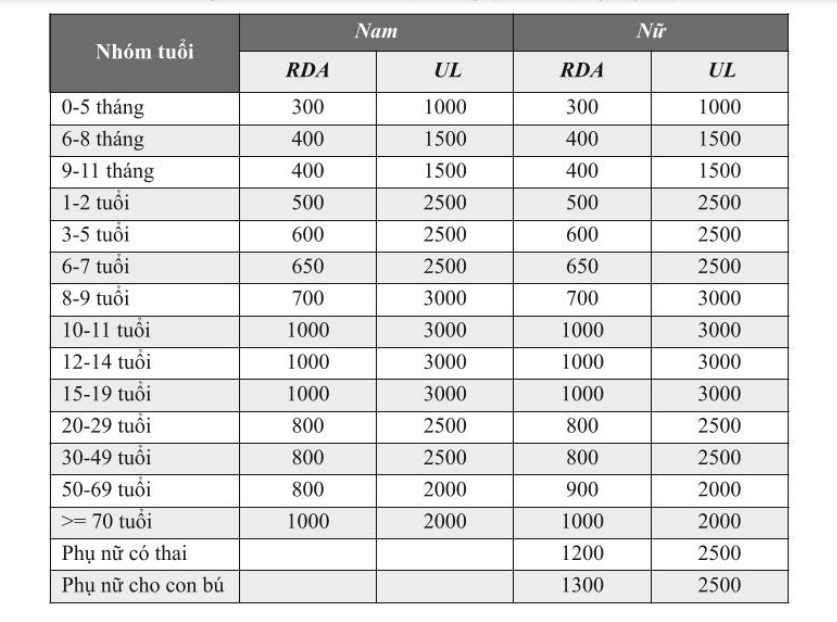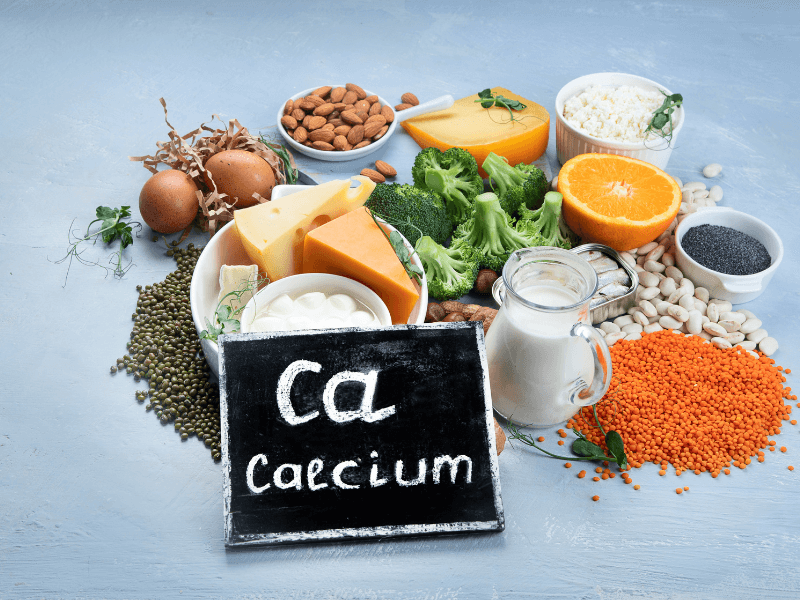Calcium is an essential mineral, accounting for about 2% of body weight and nearly 99% of calcium is concentrated in bones and teeth. However, calcium not only makes up the skeleton but also plays a role in many other important functions...
1. Why should we supplement calcium daily?
Calcium is very important in the growth process. growth, starting in the early months of pregnancy. Few people realize that bones, no matter how strong, are made up of living tissue and are remodeled and degraded throughout life. New bone is constantly replacing old bone to repair various types of bone damage.
How bones are supplied with calcium on a daily basis determines bone health, and certain stages of life are especially important. Bone mass, determined by genetics, continues to be established long after an individual's height growth has ended. Bone tissue continues to thicken during adolescence, until the age of 19 - 20 or even 25.
Then, from the age of 30, the physiological bone aging process begins, the amount of "old bone" exceeds the amount of "young bone". This loss accelerates starting from the age of 50 for women and 60 for men… and opens the way to osteoporosis.

Calcium is an essential mineral.
Therefore, at all ages, it is necessary to ensure that adequate calcium is supplied daily, as blood calcium levels are maintained within very narrow limits, using bone reserves when necessary. The effects of inadequate dietary calcium are only apparent when there are changes in bone levels (rickets in children and calcium loss in adults and the elderly). Calcium deficiency is not immediately noticeable but occurs silently.
2. What is the role of calcium?
Calcium is the most abundant mineral in the human body. Nearly 99% of calcium is involved in the formation and maintenance of bones and teeth. The remaining percentage (about 1%) plays a role in many important functions of the body, including blood clotting, muscle contraction, nerve transmission, hormone release and cell division... In the long term, dietary calcium will reduce the risk of certain diseases, including osteoporosis, colorectal cancer, arterial hypertension and overweight.
However, the positive effects of calcium are often associated with the presence of other nutrients such as vitamin D, protein, magnesium, phosphorus and fluoride... Vitamin D promotes the absorption of calcium in the intestine; protein, magnesium, phosphorus play a major role in the absorption of calcium.
3. What is the recommended dose of calcium?
According to documents from the National Institute of Nutrition, daily calcium recommendations for Vietnamese people are as follows:

Recommended dietary allowance (mg/day) for calcium. RDA (recommended dietary allowance) -UL (upper limit).
4. Where is calcium found?
The foods that provide the most calcium are milk and other dairy products (cheese, yogurt, etc.), which provide nearly 60% of the calcium we consume. This means that a diet without dairy products makes it more difficult to meet our daily calcium needs. 1/3 of the daily value of calcium comes from some green leafy vegetables, dried vegetables and fruits, and a few other sources…

Foods rich in calcium.
5. What happens when you eat too much or too little calcium?
- Eating too little calcium : Signs of long-term deficiency include osteoporosis in adults and rickets in children. The most typical signs of osteoporosis are fractures of the vertebrae and the femoral neck. The disease is three times more common in women than in men. In fact, between the ages of 30 and 80, women lose an average of 45% of their initial bone mass, while men lose only 15-20%.
Calcium deficiency also causes bone and joint deformities, bone pain, muscle and abdominal cramps, convulsions, numbness in the fingertips, anxiety and irritability, memory problems, headaches and respiratory problems. All of these show how this mineral affects our health.
- Eating too much calcium : Healthy people will eliminate excess calcium from their diet through feces, urine, sweat or milk (for breastfeeding mothers). However, for more sensitive people, high calcium intake can lead to urinary tract stones.
6. When should I take calcium supplements?
For people who do not get enough calcium from food, their doctor may recommend taking a supplement. Calcium supplements come in two main forms:
- Calcium carbonate
- Calcium citrate
Calcium carbonate is also commonly found in over-the-counter antacids such as rolaids and tums. Calcium carbonate should be taken with food to make it easier for the body to absorb, while calcium citrate can be taken on an empty stomach or with food.
To maximize calcium absorption, take no more than 500 mg at a time. You can take one 500 mg supplement in the morning and another in the evening. If you take a supplement that contains vitamin D, it will help your body absorb calcium more effectively.
Avoid eating the following foods when taking supplements because they can interfere with calcium absorption:
- Coffee and soda contain caffeine
- Foods high in salt…
7. Side effects of calcium supplements
Before taking calcium supplements, users need to be aware of the side effects of taking too much calcium, including:
- Constipation
- Bloating or flatulence
- Risk of kidney stones
Calcium can also reduce the absorption of certain medications, including osteoporosis medications, thyroid medications, and some antibiotics. So ask your doctor if your medications might interact with calcium, or just be safe and not take them at the same time. Taking calcium and vitamin D with thiazide diuretics can increase your risk of kidney stones.
The U.S. Preventive Services Task Force does not recommend calcium supplements to prevent osteoporosis-related fractures in postmenopausal women, because there is insufficient evidence to demonstrate a benefit. Other organizations, including the National Osteoporosis Foundation and the Institute of Medicine, recommend supplements if daily calcium needs cannot be met through diet alone.
Although your bones need calcium, don't take any supplements without talking to your doctor first. Find out which type of calcium is best for you, how much you need each day, and what to do if you experience any side effects.
Dr. Nguyen Thu Phuong
Source: https://giadinh.suckhoedoisong.vn/tat-ca-nhung-dieu-can-biet-ve-canxi-172250213231610864.htm




















































![[Maritime News] More than 80% of global container shipping capacity is in the hands of MSC and major shipping alliances](https://vphoto.vietnam.vn/thumb/402x226/vietnam/resource/IMAGE/2025/7/16/6b4d586c984b4cbf8c5680352b9eaeb0)













































Comment (0)